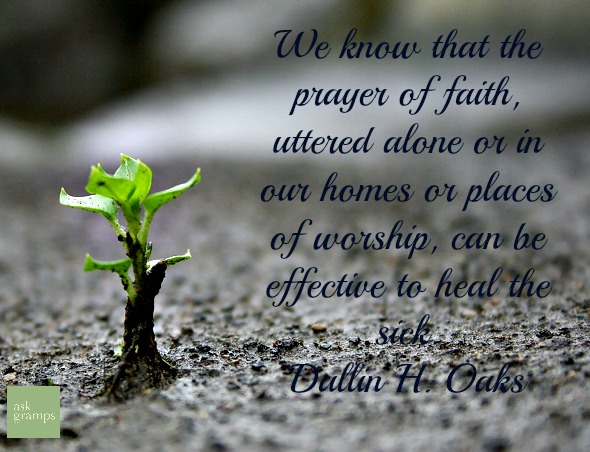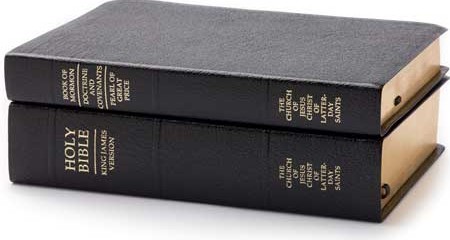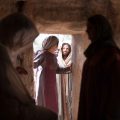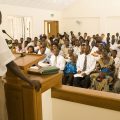Question
Gramps,
John was telling Jesus that there was a man [who not followeth them] casting out devils. But Jesus said, Forbid him not: for there is no man which shall do a miracle in my name. From my understanding – people can perform miracles with faith alone and do not need the Priesthood to perform miracles?
Marco
Answer
Hello Marco,
I think Mark 9, verses 39-42 really gets to the core of what Jesus is trying to teach John:
39 But Jesus said, Forbid him not: for there is no man which shall do a miracle in my name, that can lightly speak evil of me.
40 For he that is not against us is on our part.
41 For whosoever shall give you a cup of water to drink in my name, because ye belong to Christ, verily I say unto you, he shall not lose his reward.
42 And whosoever shall offend one of these little ones that believe in me, it is better for him that a millstone were hanged about his neck, and he were cast into the sea.
Jesus’ primary concern in this context seems to be for the anonymous stranger who, out of good intentions, is trying to do good in Jesus’ name and advance His cause. The Lord did not want the zeal of this spiritual “little one” to be squelched, or “offended”, by an inappropriate insistence on legalistic procedures. Of this situation Elder James E. Talmage wrote (in Jesus the Christ, chapter 24, pages 390-391):
“That the man who had attempted to do good in the name of Jesus was evidently sincere, and that his efforts were acceptable to the Lord we cannot doubt; his act was essentially different from the unrighteous assumptions for which some others were afterward rebuked; he was certainly a believer in Christ, and may have been one of the class from which the Lord was soon to select and commission special ministers and the Seventy.”
In a footnote to this passage, Elder Talmage contrasts this incident with the unsuccessful attempt of the sons of Sceva to cast out devils in Christ’s name as related in Acts 19:13-17.
Is it possible to work miracles through faith alone? Clearly, yes. In a recent conference address on healings, Elder Dallin H. Oaks taught:
We know that the prayer of faith, uttered alone or in our homes or places of worship, can be effective to heal the sick. Many scriptures refer to the power of faith in the healing of an individual. The Apostle James taught that we should “pray one for another, that ye may be healed,” adding, “the effectual fervent prayer of a righteous man availeth much” (James 5:16). When the woman who touched Jesus was healed, He told her, “Thy faith hath made thee whole” (Matthew 9:22). Similarly, the Book of Mormon teaches that the Lord “worketh by power, according to the faith of the children of men” (Moroni 10:7).
A recent nationwide survey found that nearly 8 in 10 Americans “believe that miracles still occur today as [they did] in ancient times.” A third of those surveyed said they had “experienced or witnessed a divine healing.” Many Latter-day Saints have experienced the power of faith in healing the sick. We also hear examples of this among people of faith in other churches. A Texas newspaperman described such a miracle. When a five-year-old girl breathed with difficulty and became feverish, her parents rushed her to the hospital. By the time she arrived there, her kidneys and lungs had shut down, her fever was 107 degrees, and her body was bright red and covered with purple lesions. The doctors said she was dying of toxic shock syndrome, cause unknown. As word spread to family and friends, God-fearing people began praying for her, and a special prayer service was held in their Protestant congregation in Waco, Texas. Miraculously, she suddenly returned from the brink of death and was released from the hospital in a little over a week. Her grandfather wrote, “She is living proof that God does answer prayers and work miracles.”
Truly, as the Book of Mormon teaches, God “manifesteth himself unto all those who believe in him, by the power of the Holy Ghost; yea, unto every nation, kindred, tongue, and people, working mighty miracles … among the children of men according to their faith” (2 Nephi 26:13).
(Emphasis added.)
What, then, is the advantage of having a priesthood holder attempting to call down the same miracle?
Primarily, the advantage lies in the authority of the person offering the blessing. This authority allows the priesthood holder the discernment he needs to, in the words of Bruce R. McConkie, “stand in the place and stead of his Master—who is the Chief Elder—in ministering to his fellowmen” (Only an Elder, June 1975) such that the priesthood holder’s voice becomes the Lord’s voice; the priesthood holder’s acts, the Lord’s acts.
The Lord recognizes this authority and, in the 42nd section of the Doctrine and Covenants, offers a special promise to those who seek blessings of healing through it:
44 And the elders of the church, two or more, shall be called, and shall pray for and lay their hands upon them in my name; and if they die they shall die unto me, and if they live they shall live unto me. . . .
48 And again, it shall come to pass that he that hath faith in me to be healed, and is not appointed unto death, shall be healed.
Notice that this promise does not say “may” be healed, or “might” be healed; but shall (for which one could grammatically substitute “must” or “will”) be healed.
Priesthood authority, then, can facilitate the working of great miracles even if those same miracles might also be attainable by faith alone. However, one place where priesthood authority is absolutely irreplaceable is in the governance of the Church and the administration of saving ordinances. In address entitled simply “Ordinances” given at BYU on February 3, 1980, Elder Boyd K. Packer drew a connection between the words ordain, ordinance and order; and I would highly recommend that you read the entire talk. It is available here.
Gramps







